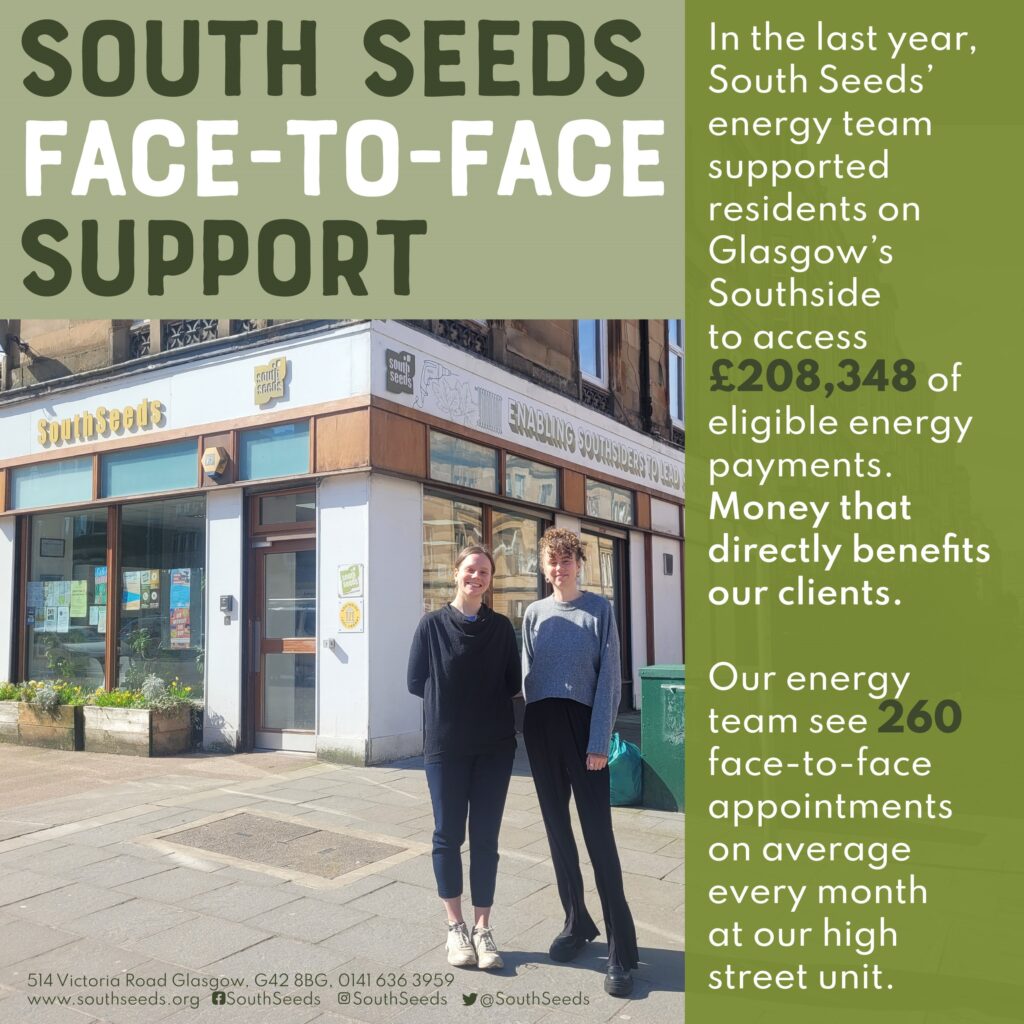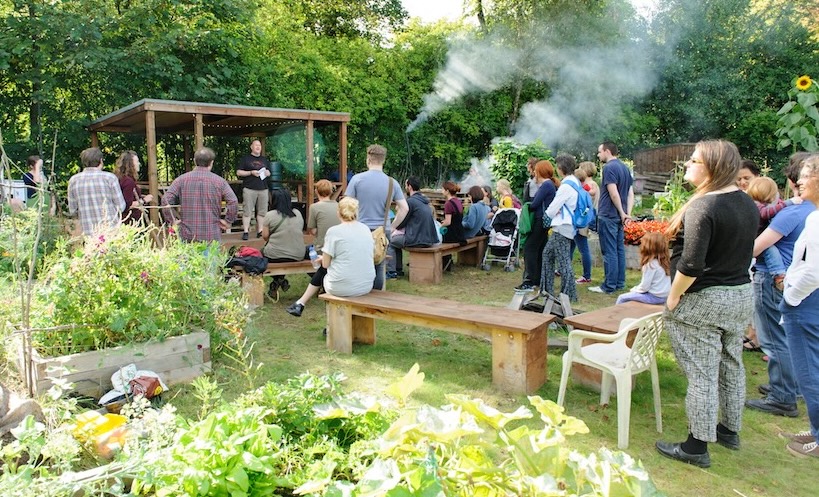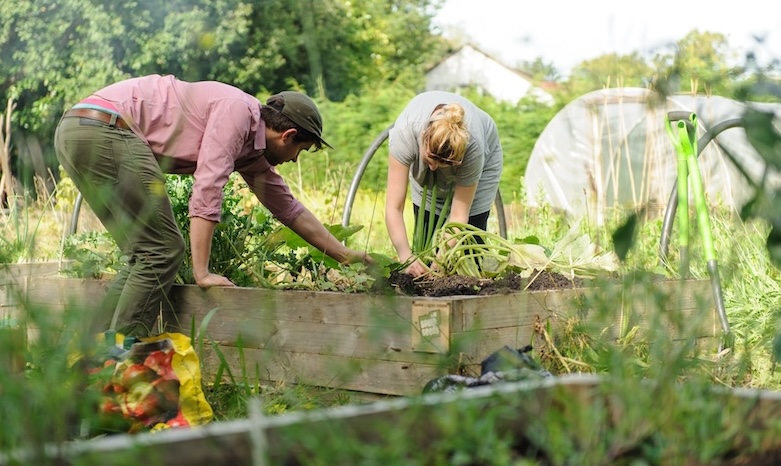This month Lucy Gillie, General Manager of South Seeds shares details on the amazing work they undertake as well as some of her personal climate journey.
Tell us about South Seeds.
South Seeds is a community organisation based in the South Central area of Glasgow. We aim to work in partnership with residents and organisations with the local community to help improve the look and feel of the area. Our mission is to enable Southsiders to lead more sustainable lives.
What inspired you to take your first step into community climate action?
Before joining South Seeds I worked in policy and left because I felt that I could make more of a difference in the community space. I wanted to connect community with policy rather than the other way round. Prior to that I made the decision when I went to university in the 1990s that I wanted to make a difference. I was shocked by the threat of genetically modified food and the irresponsibility of companies such as Shell. I choose to learn about, and work in, the field of environmental protection and improvements.
I was attracted to South Seeds because the organisation is very local to me and I could see the potential of its vision. I joined because I knew I could work with South Seeds to enable the organisation to fulfil its potential and make that vision a reality. Since joining I’ve bought on board a great team and we all work hard to make it happen.
What’s the one community climate action you’ve undertaken that you think had the most impact?
There are so many answers to that, but I’ll highlight two very different projects South Seeds undertakes. Firstly, our energy programme has been running for over 12 years now and has been very successful, both in terms of the funds it has pulled in from many different places and the amount of people it has engaged. The area we operate in is high density and there are loads of people in rented accommodation who need advice. We currently have a great team of three energy officers and a huge number of residents have come to us asking for advice on energy. So much so we have a two to three week wait for an appointment to see one of our energy officers. We’ve also managed to influence energy policy.

At the other end of the spectrum is one of our smaller projects, the Southside Tree Trail. This very popular trail connects urban dwellers with the biodiversity on their doorstep. The trail is a circular walk around Glasgow’s southside and takes in three parks. Along the way walkers learn about 12 different types of trees. Each month South Seeds run guide tree trail walks which are well attended. Lucy said “We have uncovered a demand for local tree knowledge, so we continue to organise the monthly guided tree trails with our tree expert.”
What story from your community would you like to share?
In the first ten years, we didn’t prioritise talking about climate change, instead we focused on promoting low carbon solutions. People know when they engage with us that we are an environmental organisation, but we don’t want people to feel the responsibility of taking on climate change. For example, when we talk about the benefits of using our Tool Library, we highlight that it saves space in cupboards and that it saves money because people don’t have to buy a lot of different tools as you can borrow what you need, rather than it helps save the planet. We focus on direct and tangible benefits to people’s lives. Another example is our offer to get involved in community growing opportunities if you live within a 20 minute walk of our site. It’s not only about the opportunity to grow vegetables and salad items, it’s also about meeting people in the same area as you live in. However as the body of evidence of our warming planet grows, we are starting to introduce more information about climate change.
When South Seeds started in 2011, the terms Net Zero and Just Transition were not used and now these terms would be part of our core values. I’ve made it my responsibility that every project we deliver has tangible low carbon outcomes. I take on the weight of this so people we engage with can see our projects mainly as delivering benefits for them. We don’t do doom and gloom. We work towards a positive future that is relevant for those we engage with.
What’s your advice/tips for other community groups wanting to start to take collective action against a changing climate?
If you can, have a presence on the High Street or a busy main street in your community. We’re based on our local High Street and it’s worth the extra costs to be here rather than located on a quiet side street. We get a lot of natural foot fall which means we don’t have to constantly remind people we are here. Also, if people take the time to come to the High Street to see us and we are very busy, their time hasn’t been wasted as there are other things they can do. So integrate yourself as much as possible into the services that are already in place.
We’ve also got big windows so people coming to see us can see inside and see if there are already a few folk waiting. They can then make a decision on whether or not to come in and wait. We also always advertise our opportunities in our windows first before putting them on social media, so anyone walking by can read about our opportunities before those online.

Is there anything else you’d like to share?
South Seeds was the first Scottish Charitable Incorporated Organisation (SCIO) to be set up in Scotland so we started from innovative beginnings. I recommend this structure. I also think one of the reasons for our success lies in the fact that we run a wide variety of both long and short term projects so our eggs aren’t only in one basket.
Keep up to date with South Seeds via their social media:
Instragram @southseedsglasgow
Facebook https://www.facebook.com/SouthSeeds

